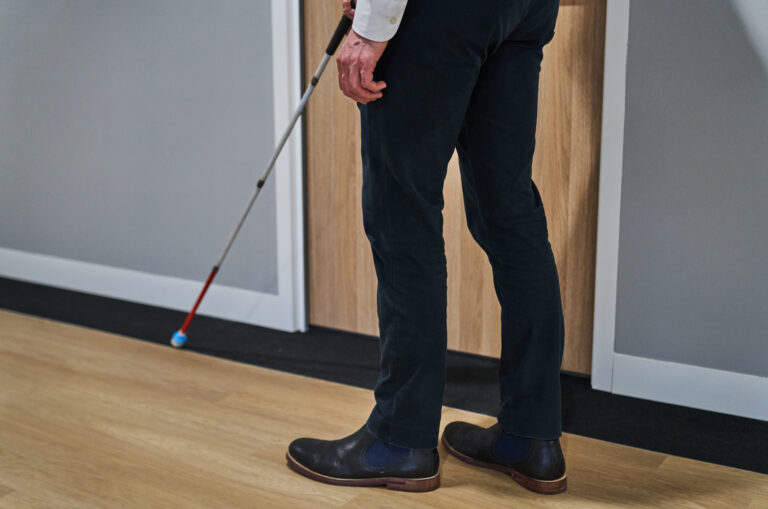Living with low vision or blindness can impact emotional and mental well-being, especially if your vision is changing, or you are navigating life changes or transitions.
Feelings of anxiety, depression or isolation are not uncommon when the world around you suddenly feels less accessible. In fact, depression can affect approximately 1 in 3 people with low vision.[i]
It’s important to remember that if you’re experiencing these emotions, they are normal and common responses. Chances are, there are others who are experiencing the same feelings.
The last study to ascertain rates of low vision in Australia was in 2016, funded by the Australian Government. It found that 453,000 Australians were living with vision impairment or blindness at the time. But since 2016, Australia’s population has increased by just over 12%, indicating that rates are likely higher.
Among these figures are individuals who have and continue to face the same emotional challenges you might be facing, while also achieving wellbeing in many ways. Through vision services, peer and community groups and other wellbeing services, there are ways to help you reclaim confidence and connection.
The emotional impact of vision loss
When first experiencing vision loss, it’s common to feel emotions like loss, sadness, anger and isolation. People with vision impairments can have higher rates of depression and anxiety compared to the general population. The CDC reports that younger adults who experience vision loss can have almost 5 times the risk of serious anxiety of depression than older adults.
There is support to help you navigate these responses. If you are experiencing vision loss, live with low vision or blindness or support someone who does, it can help to first recognise these common responses and experiences.
Do you recognise any of the below emotions in yourself or someone you are supporting?
- Feelings of sadness, loss or hopelessness
- Anger and/or irritability
- Reduced interest in typical activities or previous interests and general low energy
- Disruptions in your sleep
- A lack of appetite and weight loss
- Foggy thinking or difficulty in concentrating
- Intrusive thoughts
If so, there is support for you to help take care of yourself as you navigate these common responses to low vision or blindness.
The types of support available
Professional
Anyone—at any age, at any stage—can benefit from the right conversation. Guide Dogs Queensland and Guide Dogs Victoria offer counselling services to help you navigate vision loss.
You are also entitled to a mental health treatment plan, allowing you to claim up to 10 individual and 10 group sessions with a mental health professional each year. You can receive more information and receive a mental health assessment by seeing a doctor. Learn more at Services Australia.
Some other helpful resources if you are experiencing distress or symptoms of depression or anxiety include:
Community
Listening to the experiences of others with low vision or blindness can immediately help with feelings of isolation or other symptoms of anxiety and depression.
Explore different community and peer groups to make connections and hear from others. You can also explore your Guide Dogs state or territory’s website to learn more about local groups.
Family and friends
Many symptoms of depression or anxiety can stop you from reaching out to family or friends.
Remember that nobody is more interested in your wellbeing than those closest to you, and they can play the biggest role in helping you to stay mentally well.
Don’t be afraid to reach out to those around you and simply let them know that you are struggling with your mental health. Opening up about the challenges you’re experiencing can play a large role in helping you take the steps to wellbeing. You may simply want someone to be there for you or you could discuss ways they can support you in your day-to-day.
Practical steps to support your mental health
Guide Dogs often refers to what is known as the PERMA model for framing and achieving wellbeing.
- Positive emotion – far beyond just ‘happiness’, positive emotions can be habitually introduced to daily life. Feelings of gratitude, joy, pride, amusement, surprise and more – these can all reflect small day-to-day moments that can help build wellbeing. There are so many ways to pursue positive emotions. Listening to music, watching movies, going for walks, catching up with friends. Trying to seek small moments of positive emotion can go a long way in navigating vision loss.
- Engagement – this is also known as ‘flow’. It’s all about pursuing activities that take you out of your active, conscious mindset where you might focus on negative thoughts and, instead, lose track of time in an activity and allow time to flow on by.
- Relationships – connections, whether or new, play a vital role in boosting mood and wellbeing. Guide Dogs promotes connections through community and peer groups. Being able to celebrate the smallest of moments with others and learn from their own experiences can reduce feelings of isolation and even help in the formation of new neural connections in the brain.
- Meaning – findings ways to feel a sense of meaning can come about in many ways. Hobbies, social and political causes, professions, exercise – anything can help build a sense of meaning if it provides positive feelings and satisfaction. Having a sense of meaning can help drive the desire to get up each day, excited to pursue that activity, and avoid the build-up of negative emotions.
- Accomplishment – through any of these pursuits – hobbies, professions, counselling, exercise – you can build a sense of accomplishment. The PERMA model emphasises that achieving a sense of accomplishment can help fuel a drive to pursue your interests, build on your successes and develop a sense of wellbeing over time.
[i] Horowitz A. The Prevalence and Consequences of Vision Impairment in Later Life. The Prevalence and Consequences of Vision Impairment in Later Life. 2004;20:185-195.
Ready to continue?
Seems like you have filled this form earlier. Let’s pick up where you left off.






